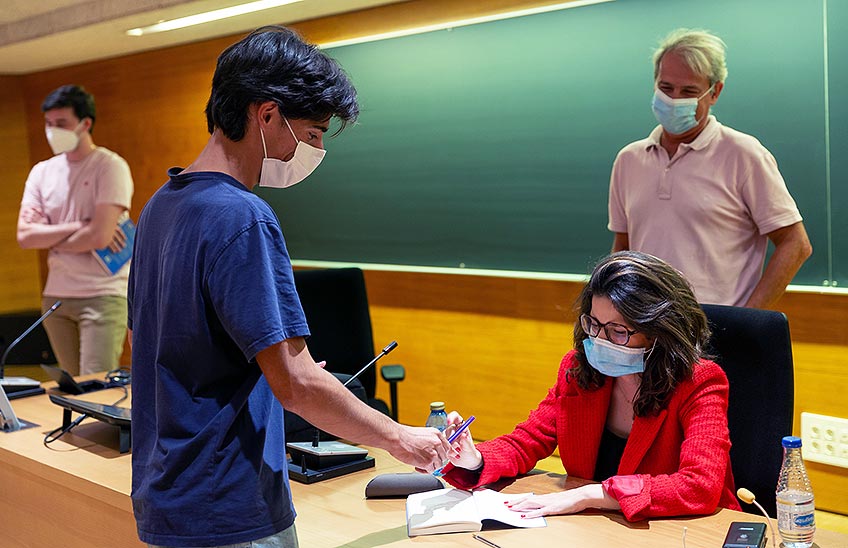Ana Iris Simón: «Al leer <i>Feria</i>, mis lectores se leen a sí mismos»
La escritora presentó en la Universidad su primer libro, que acumula ya doce ediciones en España

FotoManuel Castells/La escritora Ana Iris Simón firmando un ejemplar de su libro <i>Feria</i> tras su presentación en el Museo Universidad de Navarra
10 | 09 | 2021
El bebé de Ana Iris Simón lleva unos calcetines mostaza, un vaquerito, una camiseta naranja. Duerme apretando el puño, como si se agarrase al sueño. Cuelga de los hombros de su padre en una de esas mochilas para recién nacidos que sólo dejan ver su cabeza, el remolino que la corona y las extremidades colgantes. El padre, Paris, lo mece al fondo de la sala. La sala es uno de los talleres del Museo Universidad de Navarra, donde Simón presentó ayer Feria, su último y único libro, una revolución editorial que acumula ya doce ediciones en España y que ha despertado un intenso debate, primero intelectual, luego social y por último político sobre la situación de los jóvenes españoles y su historia como generación. El libro empieza con una declaración de intenciones: «Me da envidia la vida que tenían mis padres a mi edad».
El argumento de Feria no es más que la historia familiar de su autora, nieta de feriantes, por un lado, y de comunistas, por el otro. En el coloquio, que clausuraba el curso de verano Ellas lo cuentan todo. Escritura autobiográfica femenina, el catedrático Javier de Navascués dirigió algunas preguntas a Ana Iris Simón, y lo mismo hicieron la cincuentena de alumnos que participaron en él. Simón, preguntada por el caso, contó que su gran sorpresa al ver el éxito del libro fue descubrir que existe la norma. «Yo me preguntaba: ¿A quién le va a importar mi vida o la de mis abuelos? ¡Pero es que soy normal! Mi historia es la de casi todos los jóvenes españoles. Todo el mundo llora en los funerales, se enamora y quiere a su abuela», explicó.
Durante los últimos meses ha habido lecturas desde todos los prismas políticos: se ha dicho de Feria que es un libro nostálgico y hasta reaccionario, que presenta una Arcadia feliz que nunca fue, pero también que es un libro denuncia de la precariedad de la juventud. «Parece que si criticas las malas condiciones materiales estás pidiendo que vuelva Franco», ironizó Simón en el coloquio. Preguntada por la variedad de lecturas posibles de su obra, la escritora citó la célebre frase de Cortázar: quien subraya un libro se subraya a sí mismo. «Eso les pasa a mis lectores —explicó Simón—: al leer Feria, se leen a sí mismos».
En la conversación también se pusieron sobre la mesa, entre otros temas, la importancia de la familia o la cuestión española. “España es un problema para cualquier intelectual”, aseguró. Asimismo, habló sobre el papel de la Universidad o el trabajo de escritura y edición: “El editor sabe ver el alma y sacar la verdad del escritor”, dijo Ana Iris Simón. Al final del acto, muchos de los participantes se acercaron con ejemplares de Feria para pedir una firma.
El objetivo del curso “Ellas lo cuentan todo. Escritura autobiográfica femenina” era mostrar el proceso histórico de afirmación de la mujer en el espacio público a partir de su autor representación como escritora. En él se han abordado las primeras manifestaciones de la escritura autobiográfica de mujeres, que surgen con la modernidad europea a partir del siglo XVI. Además de Ana Iris Simón, en el programa también intervinieron las escritoras Anna Caballé, que habló sobre “Escritura autobiográfica y mujer” y Clara Obligado, que presentó su libro Una casa lejos de casa, donde describe sus recuerdos en la Argentina de la Dictadura y su llegada a la España de la Transición.
